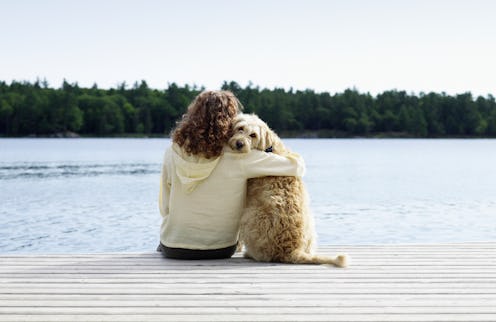Self
How To Cope With The Loss Of A Pet
"When we lose a pet, we grieve the same way as we do for a human loved one."

We are undoubtedly a nation of animal lovers – an estimated 41% of the UK's 12 million households currently have pets. From furry, four-legged friends to scaly sidekicks, the inexplicable bond we have with animals is a great source of comfort, and the loss of a pet can be completely devastating. So, when the time inevitably comes, what's the best way to work through the grief of losing a pet?
First, let's explore that unique pet-human connection. The biophilia hypothesis suggests that we are drawn to nature and natural processes, and like to affiliate with other life forms, which is a product of biological evolution. This theory can be applied to our obsession with house plants, and our love of pets, explaining why we collectively coo over the cuteness of the Andrex puppy.
And, whether your motivation for having a pet is companionship or helping you to stay active, the mental health benefits are abundant. Several studies suggest the neurological affects of having animals can reduce stress, anxiety and depression – for example, a 2018 report outlines how therapy dogs in prisons improved the mental health of inmates. Pets can make us feel safe, secure and unconditionally loved, and therefore the loss of that kind of relationship is a real blow.
While those who aren't animal lovers might say, “It’s only a dog!”, or “You can get another one!”, London-based psychologist, Dr Sophie Mort says that the reason we mourn the loss of a pet so deeply is because grief manifests in the same way, regardless of species. “When we lose a pet, we grieve in the same way as we do when we lose a human loved one,” Mort explains.
Mort goes on to reference attachment theory, which also plays a role in the powerful bond we form with our pets. “Pets often form the first, and sometimes only, secure attachment we have in our lives," she says. "They don't care what we do, what successes we gain or what mistakes we make. They make us feel like they love us for who we are, exactly as we are, which is a rarity and a gift in modern society.”
It's the simplicity of the relationship that can make the loss of a pet even harder. “We expect that we will see our animals when we get home, that they will be waiting for us as they were before they passed, and it is devastating every time we open our door and remember that they aren't there,” Mort says.
Pets are, in fact, one of the only socially sanctioned dependant relationships. “With animals, total dependance is allowed, and often truly enjoyed, and we often don't even realise how dependant we were on our pets until they are gone.”
4 resources that offer support & guidance if you’re processing the loss of a pet:
1. Animal Samaritans Pet Bereavement Service
The Animal Samaritans is a UK registered charity that rescues, shelters and provides care for unwanted or mistreated animals. Their Pet Bereavement helpline offers free help and advice for those dealing with the loss of a pet.
2. Cats Protection Paws To Listen and Grief Support
Launched in 1927, Cats Protection is the leading cat welfare charity in the UK. They offer a comprehensive list of resources to help overcome cat-related grief alongside a confidential phone line for those who need someone to talk to regarding any difficult issues such as euthanasia, burial and cremation.
3. EASE Pet Loss Support Services
EASE (Environmental Animal Sanctuary and Education) is a charity that provides education on animal welfare. Their website offers several free resources, such as podcasts, that cover multiple areas of grief, such as how to prepare for pet loss, and pet grief for children.
4. Blue Cross Pet Bereavement Support Service
The Blue Cross is the UK’s leading animal welfare charity. Their Pet Bereavement Support Service offers emotional support via their helpline, and email for those that prefer to write down their thoughts and feelings. With guidance from the British Association for Counselling and Psychotherapy, their volunteers have all had training, to provide an understanding ear for those experiencing pet loss.
This article was originally published on